|
The following are substantially all of the tools I used to build all aspects involved in the construction of my boat.
They are presented pretty much in the order that I either used or acquired them.
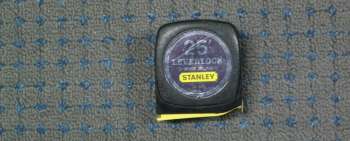 Probably one of the least expensive tools in my limited inventory, but indispensible for quick measurements. I used it to lay out my canopy,
and I take it with me to the lumberyard every time I go to buy lumber. The tape's locking feature is a must.
Probably one of the least expensive tools in my limited inventory, but indispensible for quick measurements. I used it to lay out my canopy,
and I take it with me to the lumberyard every time I go to buy lumber. The tape's locking feature is a must.
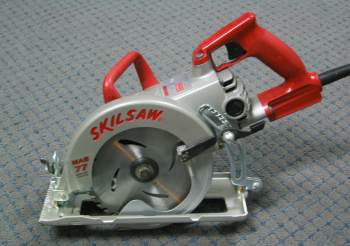 This is my favorite power tool. It is the benchmark by which all other circular saws are judged. It has a 7¼ inch carbide tipped
blade that slices through lumber like a hot knife through butter--how's that for a cliche´? Throw out the original blade that comes
with the saw, and buy yourself a quality blade; you will be happy you did. When this saw is combined with a clamped down strait edge as a guide,
it can rip lumber as effectively as a table saw. Of course I'd love to have a table saw too, but I can't afford one right now, nor do I have any
place to store one.
This is my favorite power tool. It is the benchmark by which all other circular saws are judged. It has a 7¼ inch carbide tipped
blade that slices through lumber like a hot knife through butter--how's that for a cliche´? Throw out the original blade that comes
with the saw, and buy yourself a quality blade; you will be happy you did. When this saw is combined with a clamped down strait edge as a guide,
it can rip lumber as effectively as a table saw. Of course I'd love to have a table saw too, but I can't afford one right now, nor do I have any
place to store one.
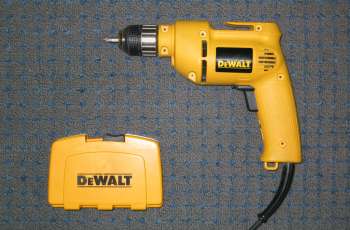 A must for drilling holes, but also indispensible for driving screws. I usually pre drill holes that I drive screws into. I would like
to get a second drill so that I wouldn't have to keep changing back and forth from drill bit to driving bit. This model has variable speed,
forward and reverse, a key-less chuck, and a leveling bubble built into the handle. The two complaints that I have are that the chuck can slip
in high-torque situations, and the back of the handle can pinch a second hand being used to put weight on the drill for more effective drilling.
A must for drilling holes, but also indispensible for driving screws. I usually pre drill holes that I drive screws into. I would like
to get a second drill so that I wouldn't have to keep changing back and forth from drill bit to driving bit. This model has variable speed,
forward and reverse, a key-less chuck, and a leveling bubble built into the handle. The two complaints that I have are that the chuck can slip
in high-torque situations, and the back of the handle can pinch a second hand being used to put weight on the drill for more effective drilling.
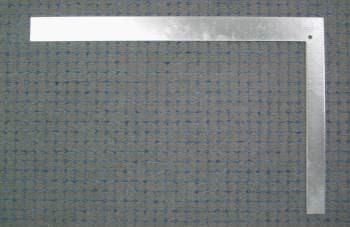 A framing square is great for drawing lines square across stock lumber, and it gives a good indication of how true the ends of the lumber are. A square can
also help you position wood pieces perpendicular to each other.
A framing square is great for drawing lines square across stock lumber, and it gives a good indication of how true the ends of the lumber are. A square can
also help you position wood pieces perpendicular to each other.
 A box cutter cuts twine, shaves wood, and can cut carpet, like I used mine for when building my canopy.
A box cutter cuts twine, shaves wood, and can cut carpet, like I used mine for when building my canopy.
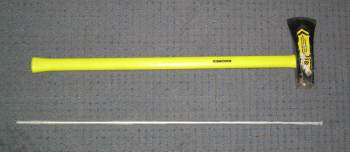 This is an 8-pound maul that I use to split firewood for when I go camping (yeah, I bring my own wood) Beneath it is a three-foot driving
rod that I used to sink the ground anchors helping to hold up my canopy. The maul is the heaviest hammer that I have, and I used it to drive
the rod.
This is an 8-pound maul that I use to split firewood for when I go camping (yeah, I bring my own wood) Beneath it is a three-foot driving
rod that I used to sink the ground anchors helping to hold up my canopy. The maul is the heaviest hammer that I have, and I used it to drive
the rod.
 This is a 48-inch measuring rule, more accurate than a tape measure or framing square. While this is a nice size to have, I may yet purchase one that
is 72-inches or even a 96-inches long.
This is a 48-inch measuring rule, more accurate than a tape measure or framing square. While this is a nice size to have, I may yet purchase one that
is 72-inches or even a 96-inches long.
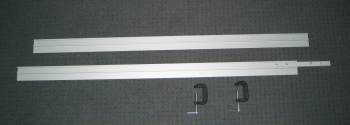 This is a two-piece straight edge that can be used singularly for 48 inch lengths, or together for 96 inch lengths. The pieces join in
the middle with set screws. Once you draw your line with the edge, you can set it back a few inches and clamp it down to use it as a
guide for saws and the like. I am very pleased with this device.
This is a two-piece straight edge that can be used singularly for 48 inch lengths, or together for 96 inch lengths. The pieces join in
the middle with set screws. Once you draw your line with the edge, you can set it back a few inches and clamp it down to use it as a
guide for saws and the like. I am very pleased with this device.
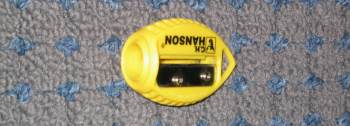 With my new carpenter's pencil, I needed a sharpener that it could fit into.
With my new carpenter's pencil, I needed a sharpener that it could fit into.
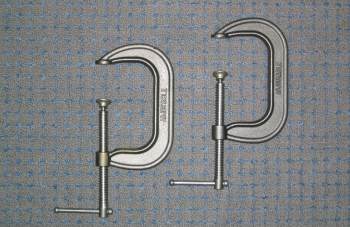 I currently have twelve 5-inch C clamps, two 4-inch, and two 2-inch clamps available for use. So far, I use these just to hold plywood to
the building table. I'm sure that I am going to use a few to hold my oar laminates together, etc.
I currently have twelve 5-inch C clamps, two 4-inch, and two 2-inch clamps available for use. So far, I use these just to hold plywood to
the building table. I'm sure that I am going to use a few to hold my oar laminates together, etc.
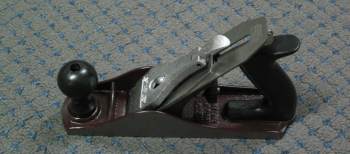 This is a bench plane. It is used to shave off wood from other pieces of wood. This thing has three separate controls for determining the cut.
I used it to 8-side my oar handles before rounding them with the rasp.
This is a bench plane. It is used to shave off wood from other pieces of wood. This thing has three separate controls for determining the cut.
I used it to 8-side my oar handles before rounding them with the rasp.
 The canopy has six lengths of cable running under its top to the ground anchors. I used these cable cutters to trim them to length.
The canopy has six lengths of cable running under its top to the ground anchors. I used these cable cutters to trim them to length.
 I used the socket wrench to tighten the nuts of the crosbys holding the cable in place.
I used the socket wrench to tighten the nuts of the crosbys holding the cable in place.
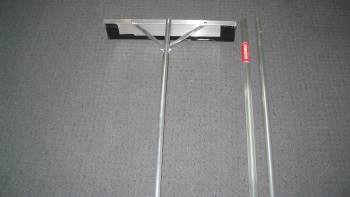 This is the tool that I use to clear the snow from the canopy. It comes in three pieces that slide and snap together. The
blade is covered with duct tape so that it does not cut into the canopy.
This is the tool that I use to clear the snow from the canopy. It comes in three pieces that slide and snap together. The
blade is covered with duct tape so that it does not cut into the canopy.
 These pliers were used to pull random staples from the edges of various pieces of lumber ( came that way) and to pull out the wire brads
that held my curved fence temporarily in place.
These pliers were used to pull random staples from the edges of various pieces of lumber ( came that way) and to pull out the wire brads
that held my curved fence temporarily in place.
 This 12" rasp can file down or remove unwanted wood quickly.
This 12" rasp can file down or remove unwanted wood quickly.
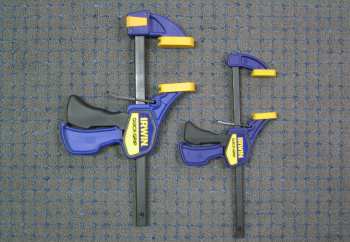 Yup, I needed more clamps. I tried out these Quick Grip clamps while I was making the oars and found them so easy to use that I
picked up four for myself. You can "one handed" clamp things very firmly to other things, where as the C-clamps I have require two hands
and can apply so much force to the wood as to make indentations in it. I know, you can use pieces of scrap wood to protect your project, but
that requires a third hand?
Yup, I needed more clamps. I tried out these Quick Grip clamps while I was making the oars and found them so easy to use that I
picked up four for myself. You can "one handed" clamp things very firmly to other things, where as the C-clamps I have require two hands
and can apply so much force to the wood as to make indentations in it. I know, you can use pieces of scrap wood to protect your project, but
that requires a third hand?
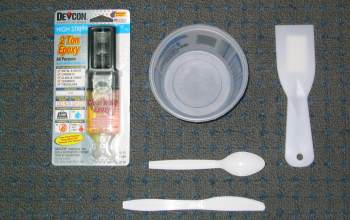 I used two 25 ml tubes of epoxy to glue each cheek to each oar. Squirt two tubes into the small plastic container, then mix for five minutes
with the plastic knife. Apply and spread with the plastic putty knife, and use the spoon to collect the excess epoxy that oozes out from
the joints when clamping.
I used two 25 ml tubes of epoxy to glue each cheek to each oar. Squirt two tubes into the small plastic container, then mix for five minutes
with the plastic knife. Apply and spread with the plastic putty knife, and use the spoon to collect the excess epoxy that oozes out from
the joints when clamping.
Note: I now use straight epoxy for initially wetting wood, or applying cloth. Otherwise, I mix with wood
flour to a constistency that is job dependant.
 I have had this $20 jig saw for about 15 years -- used it twice in all that time. I am using it a third time to cut out the blanks for the oars.
I have upgraded it with a new blade, as new jig saws go for about $170. I will probably use it again to cut out the windows in the sides of the
boat.
I have had this $20 jig saw for about 15 years -- used it twice in all that time. I am using it a third time to cut out the blanks for the oars.
I have upgraded it with a new blade, as new jig saws go for about $170. I will probably use it again to cut out the windows in the sides of the
boat.
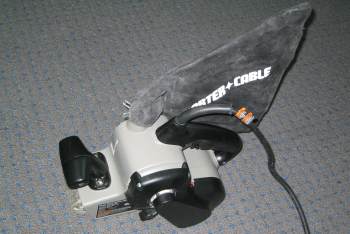 This is one powerful tool! If you set it down with the trigger locked on, it will take off on you across the table at an amazing speed. You
have to be vigilant as to how long you keep the sander in one location. Its best to keep the thing moving around. It could easily sand clear
through a 2 x 4 without much effort.
This is one powerful tool! If you set it down with the trigger locked on, it will take off on you across the table at an amazing speed. You
have to be vigilant as to how long you keep the sander in one location. Its best to keep the thing moving around. It could easily sand clear
through a 2 x 4 without much effort.
 I should have gotten these a long time ago. Only two bucks, distortion free, and fit right over my glasses. Clean only with soap and water
and "air" or "pat" dry, otherwise they will accumulate scratches very quickly.
I should have gotten these a long time ago. Only two bucks, distortion free, and fit right over my glasses. Clean only with soap and water
and "air" or "pat" dry, otherwise they will accumulate scratches very quickly.
 The 8-inch is a less aggressive rasp. I am almost an artiste' with one of these.
The 8-inch is a less aggressive rasp. I am almost an artiste' with one of these.
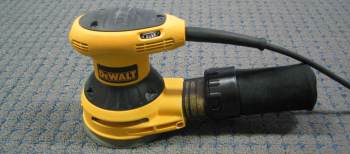 I turned my rough-cut set of oars into works of art with this random orbital sander. It uses 5" hook and loop sanding discs at the
bottom of its pad. While the attached bag certainly catches a substantial amount of sanding dust, I still had lots of dust everywhere.
I turned my rough-cut set of oars into works of art with this random orbital sander. It uses 5" hook and loop sanding discs at the
bottom of its pad. While the attached bag certainly catches a substantial amount of sanding dust, I still had lots of dust everywhere.
 While I still can't cut a straight line with one of these, I use this saw to finish a cut where two circular saw cuts converge.
While I still can't cut a straight line with one of these, I use this saw to finish a cut where two circular saw cuts converge.
 This is just a simple compass that I had laying around. It can make a circle with a maximum diameter of 12-inches. But when you install and
extend a full size pencil in its grip, you can get up to a 16 inch circle. Here it is set for a radius of 7 and 1/4-inches, yielding the
14 1/2-inch cutout you saw in Bulkhead 4.
This is just a simple compass that I had laying around. It can make a circle with a maximum diameter of 12-inches. But when you install and
extend a full size pencil in its grip, you can get up to a 16 inch circle. Here it is set for a radius of 7 and 1/4-inches, yielding the
14 1/2-inch cutout you saw in Bulkhead 4.
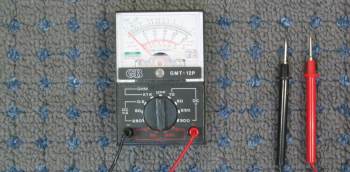 There's nothing like using an old analogue voltmeter to test for live circuits. I used this one first to confirm the colored wires to my
tail lights matched my wiring diagram for them when setting up for my trailer.
There's nothing like using an old analogue voltmeter to test for live circuits. I used this one first to confirm the colored wires to my
tail lights matched my wiring diagram for them when setting up for my trailer.
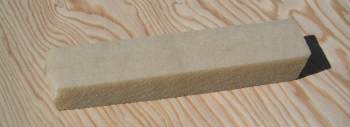 It not only looks like an eraser, it is an eraser. When I bought my belt sander, I was told that its sanding belt could be cleaned of sanding
debris by rubbing the eraser over the belt as it was spinning. This actually works! Very little of the eraser gets worn down as the belt is
practically renewed.
It not only looks like an eraser, it is an eraser. When I bought my belt sander, I was told that its sanding belt could be cleaned of sanding
debris by rubbing the eraser over the belt as it was spinning. This actually works! Very little of the eraser gets worn down as the belt is
practically renewed.
 The easiest way to measure out accurate batches of epoxy is with a scale. This is a Myweigh triple balance beam scale, and measures to 1/10 th of
a gram. I bought it from saveonscales.com for $78. Just be aware that there will probably be a difference in mixing ratios for volume measurements
vs. mass measurements.
The easiest way to measure out accurate batches of epoxy is with a scale. This is a Myweigh triple balance beam scale, and measures to 1/10 th of
a gram. I bought it from saveonscales.com for $78. Just be aware that there will probably be a difference in mixing ratios for volume measurements
vs. mass measurements.
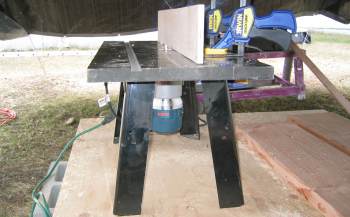 I used this set up to make several half-lap joints. The router is mine; the table belongs to my neighbor.
I used this set up to make several half-lap joints. The router is mine; the table belongs to my neighbor.
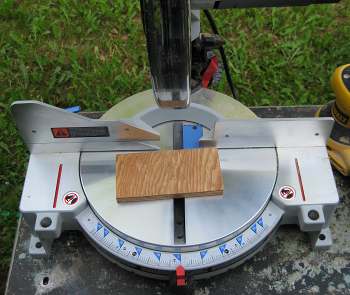 Can you get by without a chop saw? Of course, but life is just so much easier and, any job cutting lumber to length is faster with one. This is
a tabletop saw that I picked up for less than a hundred bucks.
Can you get by without a chop saw? Of course, but life is just so much easier and, any job cutting lumber to length is faster with one. This is
a tabletop saw that I picked up for less than a hundred bucks.
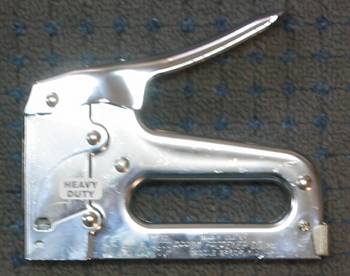 Not used on the boat, but used on the trailer. After I added a support beam down the center of the trailer, I covered it with bunk carpet. The
stapler uses 3/8-inch staples to secure the carpet to the bunk.
Not used on the boat, but used on the trailer. After I added a support beam down the center of the trailer, I covered it with bunk carpet. The
stapler uses 3/8-inch staples to secure the carpet to the bunk.
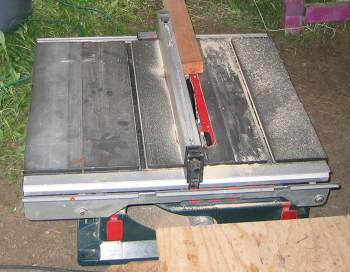 I see now how a table saw will free me to rip any size lumber that I may need, and take only the best parts from what I cut. I am no
longer constrained to the sizes and lengths that are offered by the lumber yard. I now look at wood for the forms that I can pull out
of them; I don't know if I can adequately explain how liberating this feeling is. A table saw is a must have for any serious boat builder.
I see now how a table saw will free me to rip any size lumber that I may need, and take only the best parts from what I cut. I am no
longer constrained to the sizes and lengths that are offered by the lumber yard. I now look at wood for the forms that I can pull out
of them; I don't know if I can adequately explain how liberating this feeling is. A table saw is a must have for any serious boat builder.
I borrowed this one from my employer, but one is definitely going on my wish list.


|

